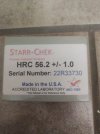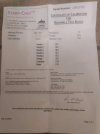- Joined
- Jul 22, 2013
- Messages
- 261
Just picked up a Wilson 4JR Rockwell tester for a screaming deal. came from a machine shop. It has all three weights attached to the back, so I should be able to test in the C scale. All the others I have looked at were missing two of the three weights. I don’t think it comes with any test blocks, does anyone know where I can pick up some of those without spending a fortune? I know I need to inspect the diamond penetrator to make sure it is still in good shape, I know those can be picked up on eBay for a good deal. If need be. So excited to get this thing and play with it. Can’t wait to test the blades I’ve been beat treating myself!



